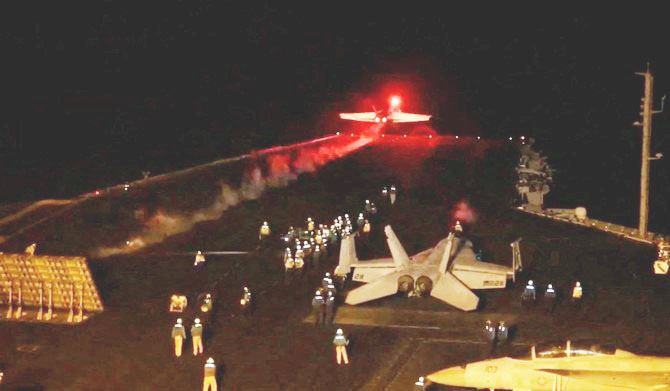WASHINGTON/DAVOS, (Reuters) – The U.S. military carried out new strikes in Yemen yesterday against anti-ship ballistic missiles in a Houthi-controlled part of the country as a missile struck a Greek-owned vessel in the Red Sea.
Attacks by the Iran-allied Houthi militia on ships in the region since November have affected companies and alarmed major powers – an escalation of Israel’s more than three-month-old war with Palestinian Hamas militants in Gaza. The Houthis say they are acting in solidarity with Palestinians and have threatened to expand attacks to include U.S. ships in response to American and British strikes on their sites in Yemen.
In a bid to cut off their funding and supply of weapons, U.S. President Joe Biden’s administration plans to put Houthi rebels back on a U.S. list of terrorist organizations, two U.S. officials told Reuters.
The Biden administration in 2021 had taken the Houthis off two lists designating them as terrorists, reversing a decision by former President Donald Trump. The latest move would put the Houthis back on one of the two lists, marking them as “specially designated global terrorists.”
The White House said additional U.S. strikes on Tuesday took out ballistic missiles Houthis were ready to launch, confirming a Reuters story earlier, citing U.S. officials, that a new strike was launched at four anti-ship missiles. The strike had not been previously reported.
“We’re not looking to expand this. The Houthis have a choice to make and they still have time to make the right choice, which is to stop these reckless attacks,” White House spokesperson John Kirby said.
France chose not take part in the U.S.-led strikes because it wants to avoid a regional escalation, President Emmanuel Macron told a news conference. The country has a “defensive” approach in the Red Sea and would stick to this stance, Macron said.
Two heads of international banking groups attending the World Economic Forum (WEF) in Davos said privately that they were worried the crisis might cause inflationary pressures that could ultimately delay or reverse interest rate cuts and jeopardise hopes for a U.S. economic soft landing.
Dubai-based logistics company DP World’s CFO Yuvraj Narayan said he expected disruptions to hit European imports.
“The cost of goods into Europe from Asia will be significantly higher,” Narayan told Reuters at the annual WEF meeting in Davos. “European consumers will feel the pain … It will hit developed economies more than it will hit developing economies.”
War risk insurance premiums for shipments through the Red Sea are rising, insurance sources said on Tuesday.
In Spain, four factories owned by French tyre maker Michelin are planning to halt output again this weekend, a further sign of the impact of delays in the delivery of raw materials.
A Malta-flagged, Greek-owned bulk carrier was struck by a missile while northbound in the Red Sea 76 nautical miles northwest of the Yemeni port of Saleef, a security firm and two Greek shipping ministry sources said.
Yemen’s Houthis carried out the attack on the ship, the Zografia, using naval missiles, resulting in a “direct hit”, the group’s military spokesperson Yahya Sarea said.
The Zografia was sailing from Vietnam to Israel with 24 crew on board and was empty of cargo when attacked, one of the Greek sources said. “There were no injuries, only material damage,” the source added. It was still sailing but would probably reroute for safety checks.
Underlining concerns, Japa-nese shipping operator Nippon Yusen 9101.T, also known as NYK Line, instructed its vessels navigating near the Red Sea to wait in safe waters and is considering route changes, a company spokesperson said.
Shipping giant Maersk MAERSKb.CO, however, sent two container ships through the Red Sea carrying goods for the U.S. military and government.
Container vessels have been pausing or diverting from the Red Sea that leads to the Suez Canal, the fastest freight route from Asia to Europe. Many ships have been forced to circumnavigate South Africa’s Cape of Good Hope instead.
About 12% of world shipping traffic accesses the Suez Canal via the Red Sea.
Egypt’s Suez Canal authority played down any disruption, saying in a statement that the suspension of transit through the canal by companies was “temporary” and that traffic through the canal was “going as per normal.”
British oil major Shell SHEL.L has suspended all shipments through the Red Sea indefinitely after the U.S. and UK strikes triggered fears of further escalation, the Wall Street Journal reported on Tuesday. Shell declined to comment.
U.S. oil major Chevron CVX.N said it is maintaining its shipping routes through the Red Sea. Exxon Mobil XOM.N, which does not own or operate shipping vessels, said it “continues to support ship owners and operators in following guidance from the Combined Maritime Forces” – a reference to a multi-national naval partnership aimed at keeping the seas safe.
Russian tanker group SovcomflotFLOT.MM is also considering alternative routes in case the crisis escalates, TASS news agency reported. Sovcomflot did not immediately respond to a Reuters request for comment.
European diplomats said member states of the European Union had given initial backing to creation of a naval mission by Feb. 19 at the latest to help protect ships.
The existing U.S.-led coalition meant to safeguard commercial traffic in the Red Sea is weak because regional powerhouses Saudi Arabia, the United Arab Emirates and Egypt have not taken part, Yemen’s vice president said on Tuesday.
“This Bab al-Mandab corridor is of interest to the whole world and to the region, so regional intervention is key,” Aidarous al-Zubaidi told Reuters in an interview, referring to the narrow strait at the southern entrance to the Red Sea.
Zubaidi’s separatist Southern Transitional Council is part of an alliance that opposes the Iran-backed Houthis in Yemen.
Saudi Arabia’s foreign minister underlined the link between Houthi attacks on commercial ships to the war in Gaza. Prince Faisal bin Farhan Al Saud said the kingdom’s priority is finding a path to de-escalation through a ceasefire in Gaza.









